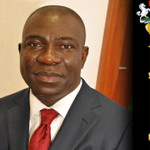FEATURES – Anambra: Where Are the Native Doctors? By Emmanuel Adigwe
Articles/Opinion, Featured, Latest Headlines Sunday, March 16th, 2025
(AFRICAN EXAMINER) – In literature, an oxymoron refers to placing two opposing ideas side by side, such as “old news” or “deafening silence.” This concept mirrors the paradox in Anambra, where a state predominantly Christian, particularly Catholic, has seen a significant rise in the practice of traditional spirituality and native medicine.
According to Catholic Hierarchy, as of 2024, Anambra has a population of 2,060,490 residents, of which 1,373,660 are Catholics, making up 66.67% of the state’s population. Furthermore, Anambra is home to Nigeria’s only basilica, the Cathedral Basilica of the Most Holy Trinity, and the country’s only beatified “saint in the making,” Blessed Iwene Tansi, from Aguleri.
Given this substantial Christian population, one would assume traditional spirituality would be on the decline. However, the number of native doctors, or “juju men,” has seen a notable increase.
The Rise of Native Doctors and Ezewanyi
In recent years, social media has fueled a resurgence of traditional religion, with many advocating for a return to indigenous beliefs instead of the “white man’s religion.” This movement gave rise to figures like “Ezewanyi,” meaning “woman king,”—women who claim to possess spiritual powers. Clad in white or red garments, these women use platforms like Facebook to dispense spiritual advice, attracting followers eager for supernatural solutions to their problems.
As the influence of Ezewanyi grew, so did the demand for native doctors, especially among individuals seeking quick wealth, particularly internet fraudsters (popularly known as “Yahoo Yahoo”). Many believe that native doctors can provide spiritual assistance for financial success, leading to an explosion in patronage. Some native doctors even engage in diabolic rituals such as “Okite” to manipulate fate in their clients’ favor.
Prominent native doctors in Anambra include:
Eke Hit (Okija), Mmiri Enwe Ilo (Igbariam), Man Pass Man (Oraifite), Onyeze Jesus (Nkpor) and Ban on Okite.
Due to rising insecurity in Anambra, the state government has banned Okite, a ritual involving charms prepared from various animals—including dogs, elephants, and monkeys—and, in extreme cases, human body parts.
This ritual, known by different names across Igbo communities (such as Oruru in Ayamelum and Awele in other regions), has been linked to crimes like kidnapping and armed robbery. The Anambra State government has identified native doctors as key facilitators of these criminal activities, leading to arrests and crackdowns.
Crackdown on Native Doctors
The government has intensified its efforts to curb crime by arresting several prominent native doctors believed to be aiding criminals. Among those arrested are: Chukwudozie Nwangwu (Akwa Okuku Tiwara Aki), Onyebuchi Isaac Okocha (Onyeze Jesus), Ekene Igboekweze (Eke Hit, Okija)
The Commissioner for Information, Dr. Law Mefor, confirmed that investigations revealed many native doctors are involved in criminal enterprises, preparing charms for kidnappers and engaging in human sacrifices for wealth and protection.
“These diabolical rituals have given rise to Ego Mbute, Oke-Ite, and Yahoo Plus, while also reviving idolatry, which is making a comeback in Igbo socio-cultural life,” Mefor stated.
He reassured that legitimate traditional medicine practitioners have nothing to fear, as the crackdown targets fraudulent individuals exploiting the trade for criminal gain.
“We acknowledge that fraudulent native doctors have infiltrated the trade, engaging in criminal activities. They must be exposed and prosecuted to sanitize the practice, combat crime, and safeguard the state,” he added.
A Visit to Mmiri Enwe Ilo
With many native doctors arrested, I traveled to Igbariam, a few miles from Onitsha, to visit Queen Sobali’s custodian, Mmiri Enwe Ilo (real name: Daniel Chukwuemeka Ofiaeli Nwakalo), who appears to be one of the last standing figures in the practice.
The journey from Onitsha to Igbariam was smooth until reaching the town itself. There are two main options for transportation:
Motorcycle (Okada) – The quickest but most expensive option, costing between ₦2,500 – ₦3,000.
Tricycle (Keke Napep) – A cheaper alternative at ₦1,600, but requires waiting for all seats to be filled before departure.
Upon arrival at Mmiri Enwe Ilo’s compound, I found a large crowd waiting to consult him. I received ticket number 052 and had to wait several hours before my turn at 7:30 PM.
When I finally met him, I expressed my desire to boost my business. After dropping ₦1,000 for divination (Afa), he outlined a series of sacrifices needed for financial success. While he did not directly request money, the spiritual work required:
Sacrifices for my maternal and paternal lineage, Sacrifice at a graveyard, Sacrifice at a river, Sacrifices for protection and progress.
The total cost for these rituals was nearly ₦300,000. However, I was told I could start with ₦150,000 and complete the rest later.
During my visit, I observed the lucrative nature of the spiritual business. Mmiri Enwe Ilo has registered his practice under his legal name and amassed significant wealth. His compound boasts a fleet of luxury cars with custom plates (Sobali 1, Sobali 2, Sobali 3) and an impressive mansion.
Soludo’s Crackdown: The Future of Native Doctors in Anambra
The business of native doctors has flourished in Anambra, but with Governor Charles Soludo declaring war on those performing “dangerous rituals,” many have gone into hiding.
For instance, Man Pass Man, a native doctor in Oraifite known for aiding internet fraudsters, has reportedly fled. Before the crackdown, accessing a native doctor was as simple as making a phone call. Now, many are hesitant to disclose their locations.
Despite this, many believe that if the government sustains its efforts, Anambra can reclaim its status as a model state. Additionally, environmental degradation caused by ritual killings of animals in rivers may decrease significantly. So far, the policy appears effective—but only time will tell how long it will last.
Related Posts
Short URL: https://www.africanexaminer.com/?p=101405






















